
By Chris Schulz
Investigative Journalist | Kaipūrongo Whakatewhatewha
Thousands of New Zealanders cross the Tasman every year in search of a better life. Why are they going? Is the Land of Oz all it's cracked up to be? And would anything entice them home? We asked those that are going, and those that have gone, then dived into the statistics, to find out.
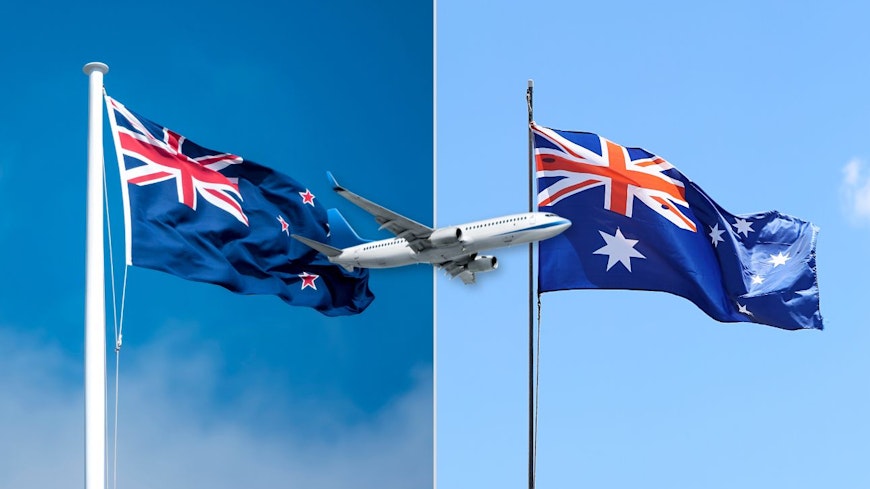
Diane* is tired, frustrated and, she admits, a little annoyed.
In 2021, as lockdowns to curb the spread of Covid-19 were enforced, she, along with her partner and their son, returned to New Zealand after spending most of the previous 10 years in Sydney.
They were looking forward to being closer to their extended family again, especially when, in the middle of New Zealand’s mandatory 2-week isolation period, Diane discovered she was pregnant with their second child.
It seemed like moving home was the right move. Based in Auckland, they'd have family support, her partner could work remotely for his Australian software firm, and she could finish her PhD. “We went for the biggest city in New Zealand because we're big city people,” Diane says.
As lockdowns eased and a sense of post-Covid normality returned to Aotearoa, Diane watched as the economy changed. Mortgage rates climbed, the cost of living increased, grocery bills rose sharply, petrol and transport costs went up, and so did the price of almost everything else.
Having spent so much time in Australia, the comparisons were easy to make, and the differences were hard to ignore. “The whole time we have been assessing ... how New Zealand has been dealing with these things,” she says.
“We've found Auckland very abrasive ... It just feels like it's falling apart.”
‘We should be able to do a lot more’
Other issues have become apparent.
Diane struggled to find decent childcare. She and her husband couldn't make sense of Auckland's complicated public transport network, so they purchased a second car and began fighting their way through the city’s congested roads.
“Public transport would make our lives cheaper, and more environmentally friendly, and enjoyable,” she says. “But it’s completely unsustainable … because it's so unreliable.”
The weekly supermarket shopping trip has become Diane's biggest concern. To save money, Diane stopped ordering online to save on delivery fees and swapped supermarkets from New World to Pak’nSave.
Even then, she struggles to believe just how much food costs each week to feed their family of four. “I just find it jaw-droppingly different in terms of groceries [compared to Australia],” she says. “… I feel like every item I put in the trolley is $5 or more. I don't know how some other families get by with these costs.”
Her disappointment is obvious. Diane feels like her family have tried their best to make life in New Zealand work for them.
So far, it’s not. “My partner earns a great wage. It feels like on the salary he gets we should be able to do a lot more … It's mind-blowing the decisions we have to make,” she says.

'The maths doesn't work for us’
After 2 years of trying to make it work in New Zealand, Diane and her family have had enough: they’re packing their bags and returning to Sydney.
There, Diane believes they’ll find a better standard of living. “I don't feel like we will be looked after by New Zealand's infrastructure or government,” she says. “There's just not enough money circulating in the economy to be able to take care of the whole country.”
They’ve worked out their budgets. Despite moving costs more than doubling from $7,000 to $15,000, Diane estimates she can earn 35% more with her academic salary. She believes the family will save money on everyday expenses, including transport, power and groceries.
It is, she says, the right decision for their family. “Knowing that I can earn that much more money in Australia means that I get to spend that much more time with my kids,” she says.
“We know our way around and can … imagine what kind of a life we may end up having over there.”
Who else is making the move?
Many New Zealanders seem to feel the same way as Diane.
Right now, it’s hard to go a full day without someone complaining about house prices, mortgage rates, food prices or other aspects of the cost-of-living crisis – the things we obsess about here at Consumer NZ too.
Anecdotally, it feels like everyone knows someone who is considering moving, preparing to go, or has already gone to Australia in an extreme effort to relieve some of the pressure.
But that’s just the word on the street. Consumer wanted something more tangible to prove definitively whether life really is better across the Tasman.
To do so, we spoke to as many people as we could find – including several who have already made the move, and one who had returned.
We dived into the statistics, and the results of our own Sentiment Tracker, to see if claims of better salaries, house prices, living conditions and lifestyle are true.
What we found is that it’s more complicated than stories like Diane’s suggest. Yes, moving to Australia can offer better wages and living conditions.
Many we spoke to were happy with the decision they’d made. But several lamented the loss of regular contact with close family and friends – something that’s not so readily available when flights across the Tasman need to be booked.
“There's always an element of homesickness,” said Amy Potter, who moved to Sydney in 2020 after landing her dream job.
“There's something special about New Zealand. It will always be home.”
So what’s making everyone leave?
The number of people making the move to Australia is close to as high as it’s ever been.
Migration is at record levels, according to Stats NZ, with 53% of those leaving New Zealand in search of a better life choosing to head to Australia.
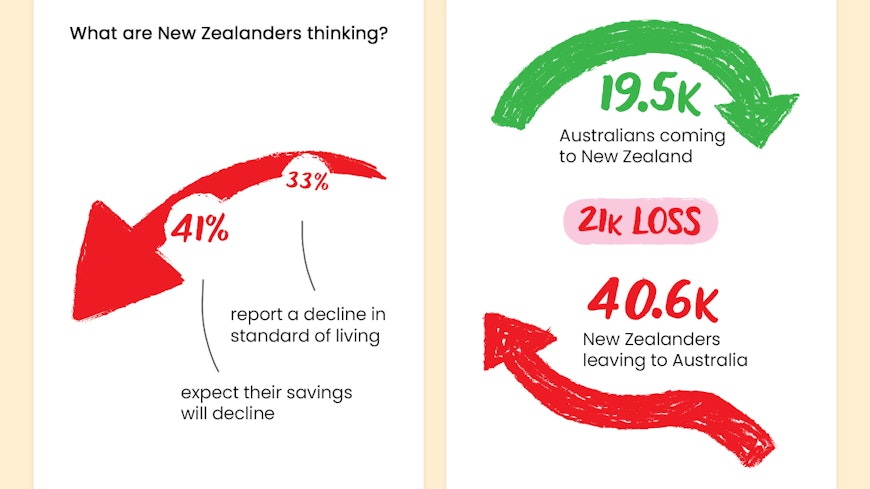
Left: source: Sentiment Tracker, Jan 2024. / Right: source: Stats NZ, year ended June 2023.
In the year to June 2023, 40,600 New Zealanders crossed the ditch – an average loss of 3,383 people every single month. (Those losses are mitigated by arrivals – 19,100 came to New Zealand from Australia in the same time frame.)
Those who are leaving appear to share Diane’s feelings about the state of the country. The most recent figures from Consumer's Sentiment Tracker show New Zealanders’ biggest concerns are the same as hers: the rising cost of living and the state of the economy.
As many as 28% of respondents report a decline in their standard of living in the last 12 months. And as many as 37% expect their savings will decline over the next 12 months.
Statistics like that are what entice people to make the move, says Johanna Smith, the founder of the website MovingToAustralia.com. Smith gets asked about those kinds of things daily. “At minimum, I get four [inquiries] a day from New Zealanders who are moving,” she says. “The grass has always been greener in Australia for a lot of people.”
Smith started her website in 2008 when she was making the move herself. She ended up moving back to New Zealand for the same issue many who go struggle with: she missed her extended family too much.
But she kept her website going to help support her husband’s moving company. Thirteen years on, it’s an essential tool for anyone with questions about packing up and moving.
Right now, she’s busier than ever. Smith puts that down to higher wages, the lower cost of living and more affordable homes. “You've always been able to afford to buy a home in Australia, and that has not been a reality for the majority of New Zealanders for years,” she says.
“Now that the food and the petrol is so high as well, it has definitely made people think, 'Oh flip, maybe I should actually do it.'”
When they make the move, what will they find there?
Salary rates
In 2017, Sonya*, a first-year teacher, found life in Napier tough.
“I had a horrendous time ... the workload, poor pay and support from the school [left me] incredibly depressed,” she says. “I had never felt so poorly and started drinking quite a bit on the weekends.”
Her contract wasn't renewed, so, at the age of 24, she booked herself a one-way flight to Darwin.
She was offered a job with a better salary within 4 days. Several years on, she’s joined a netball team, made a new friend group through work, and is earning enough to be able to spend her spare time travelling with her new husband.
When it comes to salaries, the numbers don’t lie. Across many careers, you’re likely to earn more if you move to Australia.
In New Zealand, Stats NZ says the median weekly salary is NZ$1,273; in Australia, the Australian Bureau says its median is A$1,300 (NZ$1,407).
“I felt like I was working my arse off in New Zealand and never had money to do anything,” Sonya says. “I am saving money and actually feel as if I'm stepping up in the world.”
Would she come home? No way. “It was something I had to do for myself, and I've never looked back.”
House prices
Jose Litre and his wife Julieta, along with their 10-year-old son and their dog Rollie, made the decision to move to Adelaide over a year ago.
The family had already shifted from Auckland to Taranaki in 2019 to try to save money. Yet, despite cutting their transport and mortgage costs, they still found money tight.
“Even though we lived in New Plymouth, and I had an Auckland-based salary … the cost of living was getting pretty high,” says Litre. “We couldn't really put any money aside.”
So they moved again. In Adelaide, they purchased a near-new four-bedroom home for A$500,000 (NZ$531,985) about half an hour outside of the central city.
If you want to spend your extra income on a house, the average property prices between the countries are about even: in New Zealand, REINZ reports it’s NZ$779,830 as of December; in Australia, Property Update says it’s A$757,746 (NZ$806,219).
According to the Reserve Bank of New Zealand, mortgage rates are slightly higher in New Zealand: a 7.76% average for a 1-year fixed-term rate as of December 2023, compared to 6.42% in Australia.
In New Zealand, the amount you pay will be heavily dictated by where you want to buy your house. In Auckland, according to the QV House Price Index January results, you’ll pay an average of $1,291,387; in Wellington, it’s $1,009,818; and in Christchurch you’ll pay $765,104.
Same goes in Australia. Sydney remains the most expensive city in Australia to purchase property, with an average sale price of A$1,128,322 (NZ$1,200,381). Property is more affordable in Melbourne at A$780,457 (NZ$830,300), Brisbane at A$787,217 (NZ$837,491), Adelaide at A$711,604 (NZ$757,050) and Perth at A$660,754 (NZ$702,952).
Migrants should also note that every house purchase in Australia comes with an additional stamp duty. Depending on which territory you’re buying in, it can be as much as 3-4% on top of the sale price.
However, other housing factors come into play. Litre says their home in New Plymouth was cold and difficult to heat. In Adelaide, he says their four-bedroom home is nearly new, with air-conditioning keeping the house warm in winter and comfortable in summer.
Because of the cheaper mortgage, the family has been able to save and will make their first post-Covid trip back home to Argentina in late 2024, something Litre says was difficult to do while living in New Zealand.
Living expenses
Litre has solar panels on his home, so saves money on his power bills too. “All the houses come with solar panels [so] we pay A$40-$50 (NZ$43-$53) a month for power during summer, and A$100-$120 (NZ$106-$128) during winter,” he says.
He says food is cheaper, and petrol is cheaper too. “It's so much more affordable ... The cost of living is so much less.” Is he right?
When it comes to power bills, yes. In New Zealand, the average monthly power bill is $184, according to statistics supplied by MBIE compiled between March 2022 and March 2023. In Australia, according to Comparethemarket.com.au, it’s A$137 (NZ$146). It’s worth noting that power bills averaged across a year may look different to your current usage, as power bills considerably vary between households depending on seasons and circumstances.
Food prices are a little harder to measure. Research undertaken and reported by The Spinoff and Stuff.co.nz last year suggested New Zealanders were paying up to 25% more than Australia for their groceries, but a more recent survey undertaken by Interest.co.nz shows that gap closing to just 3%. (The two countries also have different policies when it comes to GST on food. In New Zealand, it’s 15%; in Australia, it’s 10%, and many staple food items are exempt.)
New Zealand had an 8% food price index increase to September, according to Stats NZ, compared to Australia’s 4.7% increase to September.
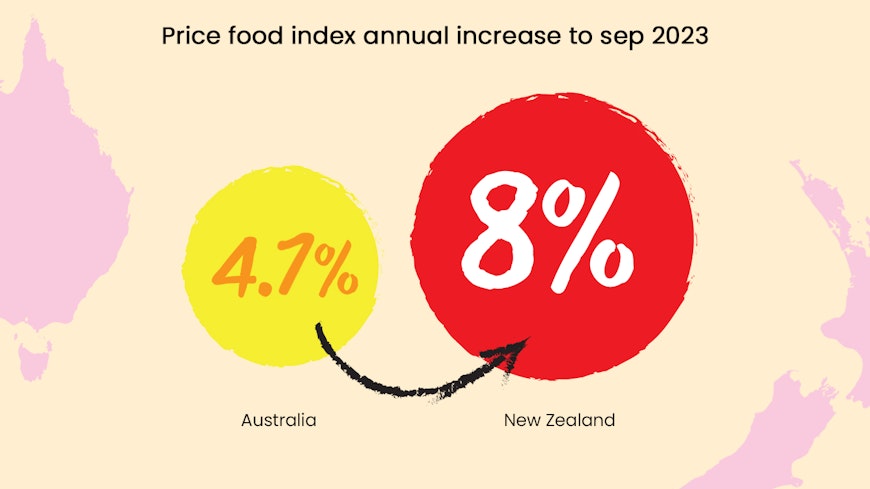
Source: Stats NZ & Australian Bureau of Statistics.
There’s no denying petrol is cheaper in Australia. When Consumer checked Gaspy, the average monthly price for a litre of 91 in New Zealand was $2.82 between 23 January and 20 February this year. In Australia, according to Fuelwatch, it’s A$1.88 (NZ$2) for the month of February.
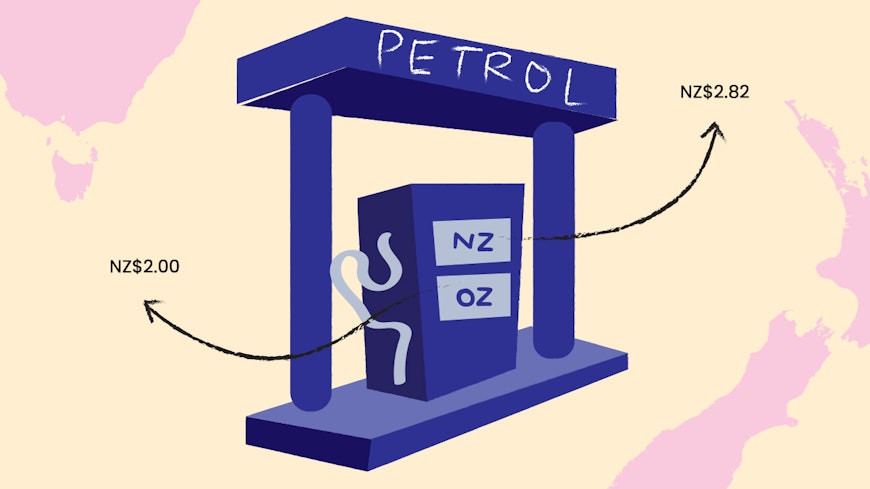
Rent
Jean Black says moving to Melbourne has been the best decision she’s made in a long time. The 71-year-old retired, sold her things, and moved into her daughter’s granny flat last year.
To make friends, she joined bridge and bowling clubs. “Everyone is extraordinarily friendly and welcoming,” she says.
If you’re looking to rent when you move to Australia, the average weekly price to rent a three-bedroom property in Australia is A$620 (NZ$660), Mozo reports, compared to NZ$580 in New Zealand, according to Figure.nz.
But, like house prices, it depends on where you want to rent. In Auckland, you’ll pay, on average, about $650 for a three-bedroom house. In Christchurch, that drops to $510.
In Sydney, the average rental rates rise to A$750 (NZ$798); in Brisbane it’s $620 (NZ$660) and Adelaide it’s just A$560 (NZ$596).
Black’s been busy encouraging her friends back home in New Zealand to make the move, too. “I would recommend any other older folks who have limited or few family members in NZ to take the plunge,” she says.
‘Things are just a lot better here’
In 2020, Amy Potter was living in Auckland with her partner. They weren’t looking to move, but Potter had a goal she was struggling to fulfil: to buy a house and get a dog.
Then she saw an ad for her dream job as marketing director at the videogame streaming company Twitch’s Sydney office. She applied, got it, and then moved when a travel window opened briefly between the two countries.
Three years on, Potter says she has more than doubled her New Zealand salary. She quickly made her dreams happen, buying a house in 2021 and getting the dog a month later, an Australian Shepherd she and her partner called Loki.
Everything others point to as a benefit of moving to Australia, she’s found to be true. She’s earning a higher salary and finds food prices and other bills cheaper; the only difference is that stamp duty charged on house and car purchases. “We didn’t really know what it would be like,” she says. “But I have loved it.”
So Potter’s staying put. Her higher income allows her to save, travel, and do everything she wants to do with her life. “It’s hard to ignore how many things are just a lot better here ... I don’t have any regrets,” she says. “I just feel sad for New Zealand. I feel guilty for leaving and not supporting the country that I so badly wish to see grow.”
Clearly, things need to change if we don’t want to keep losing people to Australia. Big things like house prices and mortgage rates continue to be major social issues; so, too, is the supermarket duopoly, which Consumer continues to monitor and campaign against. The results of our Sentiment Tracker prove people want to see real change when it comes to the country’s cost of living problems.
As this story was going to print, Potter was made redundant from her dream job after major cutbacks were made at Twitch. But even that isn’t enough for her to consider returning to Aotearoa. “I'm looking for the next thing I can bring my passion to,” she wrote on X (formerly Twitter) a day later. “Please let me know of any openings, remote or Sydney based.”

Names changed to protect identities.
This story was updated on May 28 to include the median Australian salary.
*All NZD conversion figures accurate as of February 2024.
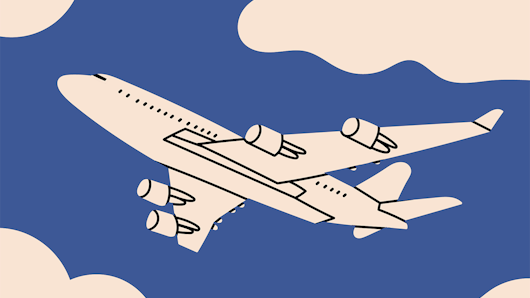
Flight rights campaign
We’re calling for airlines to communicate honestly with passengers about the reason for cancellations and delays, and clearly display their rights.


